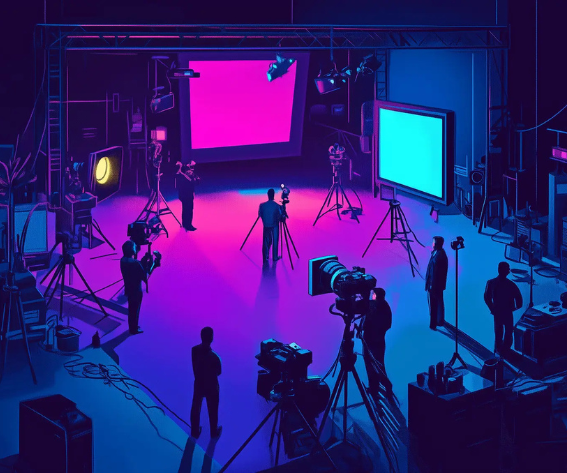The movie industry cannot be left out of the application of the new technologies. Whenever the medium changes, like the introduction of sound and colour or the introduction of CGI, the filmmakers are always in the situation where they are challenged on what they can do. Another major change that is being implemented currently is artificial intelligence (AI). The application of AI tools has ceased to be a mention, but has become a helpful device that can save time, cut costs, and rewrite the history of creativity in the filmmaking and screenwriting industry.
The Automation of Pre-Production
One of the most time-consuming parts of a movie is pre-production. Script breaking, storyboarding and scheduling can require weeks. Now it is automated with the help of AI tools. Software may be used to analyse a screenplay in order to identify props, locations, and characters, as well as generate draft shooting schedules. This does not only accelerate the planning process but also minimizes the human aspect in the process of the planning process, enabling the filmmakers to focus on narrating the story.
AI is also changing how storyboards are created. Instead of manually sketching each frame, writers and directors can input scene descriptions into an AI Video Generator. Within minutes, the tool can create visual previews of scenes, helping the creative team envision tone, pacing, and shot composition before cameras roll. This bridges the gap between imagination and execution, ensuring everyone shares the same vision from the start.
Writing Support and Innovative Inspiration
Screenwriting has always been a solitary and tedious art. Although AI will never replace the human touch of originality, it can be a great ally. The tools, such as AI-powered script editors, propose dialogue ideas, identify discrepancies, and assist writers in refining their pacing. They are also able to break down thousands of screenplays to understand what makes a story appealing to audiences and provide data-driven feedback.
To authors who are stuck in the creation process, AI can be a source of prompts, character arcs, or even different endings. Instead of telling the story, these tools are viewed as an extension of the brainstorming partner, whereby new ideas are generated that the writer can tweak and develop. This is where AI comes in, thanks to its ability to strike a balance between human creativity and machine efficiency.
Enhancing Post-Production
Another sector in which AI is having a significant influence is post-production. Suites are now computerised with algorithms that automatically filter through hours of raw footage and mark the most useful takes according to various criteria, such as emotion, framing, or actor performance. Colour grading is also the traditionally painstaking process, but with AI, one can shorten the time spent on it, as it can learn the visual styles and apply them to the entire scene with the same consistency.
Perhaps the most exciting developments are happening in voice and dialogue editing. Dubbing and voice replacement have always been costly and time-intensive, but innovations like lip sync AI are changing that. These tools modify the mouth movements in the video to suit the new dialogue of the same language or a translation. This implies that global distribution is more natural and quicker, which removes the unnatural quality of words and visuals that the audience can feel.
Complementing this, a video translator can automatically convert spoken dialogue into different languages while preserving tone and emotion. By using the technology in conjunction with lip sync, the filmmakers can localise the film for audiences worldwide in a faster and more accurate way than ever before. This creates new sources of revenue and ensures that creative work becomes recognisable in different cultures without losing its authenticity.
Democratising Filmmaking
AI is not only helping major studios, but it is also helping independent filmmakers. The teams of specialists and the expensive equipment that were necessary in the past can now be accomplished with freely available software. With an AI video generator, a lip-sync dialogue editor, and a translation system, an indie creator can create a professional-looking appearance, have a seamlessly edited dialogue, and gain an entry point into global markets, all without a Hollywood-sized budget.
This democratisation creates a multiplicity of storytelling. Underrepresented communities can do this, as voices that once experienced issues with the lack of resources can now create and share high-quality content. With the increasing number of creators in the industry, audiences get access to more diverse ways of seeing and more storytelling.
The Considerations of Ethics and Creativeness
Although AI can be of great advantage, it also brings up significant ethical and creative issues. As a case in point, to what extent is it too much AI involvement? Should the writer lose his voice when an AI tool recommends significant modifications to a script? On the same note, there can be abuse of technologies, such as lip sync and translation, to create deepfakes or unauthorised versions of performance.
The film industry needs to formulate rules that ensure openness, respect for intellectual rights, and protection of artistic integrity. The viewers must never be unaware of when AI has been used to influence what they are watching on the screen. More to the point, AI is intended to complement, rather than substitute for, the distinctly human elements of filmmaking, i.e., empathy, creativity, and emotional connection.
Looking Ahead
The use of AI in movies and screenwriting is in its early days, yet its direction is evident. We will experience more streamlined interactions between people and machines as the tools become more sophisticated. Authors will use AI to write more quickly and extensively. The directors will utilise intelligent video generators to create immersive pre-visualisations. Automated but accurate assistance will help editors work on projects within record time.
Ultimately, the filmmakers who will succeed most will be those who see AI as a partner, not a threat. With the integration of human imagination and machine intelligence, the industry will be able to be more ambitious, more accessible, and more globally connected than previously.









Leave a reply